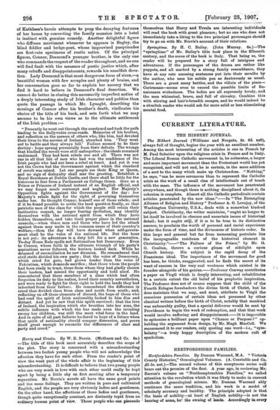CURRENT LITERATURE.
THE HIBBERT JOURNAL.
The Hibbert Journal (Williams and Norgate, 2s. 8d. net), always full of thought, begins the year with an excellent number. Among the most interesting of the articles is one in French by M. Paul Sabatier upon the religious crisis in France and in Italy. The Liberal Roman Catholic movement is, he reiterates, a larger and more important movement than the Protestant world has yet recognised, and will not end, he is certain, in the more addition of a sect to the many which make up Christendom. " Nothing," he says, "can be more erroneous than to represent the Catholio crisis as the work of a small clan of intellectuals out of touch with the mass. The influence of the movement has penetrated everywhere, and though there is nothing disciplined about it, its cohesion is complete. Almost all the Catholic periodicalicontain articles penetrated by the new ideas."—In " The Entangling Alliance of Religion and History" Professor A. 0. Lovejoy, of the Washington University, U.S.A., deals with a somewhat kindred subject. Christianity, the writer maintains, "ought no longer to let itself be involved in obscure and uncertain issues of historical detail; but it ought still, if it is to be true to its distinctive essence, to proclaim the worth of personal and racial experience under the form of time, and the divineness of historic order. In this large and general but far from unmeaning postulate lies the inexpugnable residuum of the historical element in Christianity."—"The Failure of the Friars," by Mr. G. G. Coulton, throws a curious gleam of sidelight upon Church history. His subject is the rapid decay of the Franciscan ideal. The importance of the movement for good has been, he thinks, exaggerated, and he finds the secret of its want of success in the very real weakness which existed in its founder alongside of his genius.—Professor Conway contributes a paper on Virgil which is deeply interesting, and rehabilitates to a certain extent the old belief of his prophetic inspiration. The Professor does not of course suppose that the child of the Fourth Eclogue foreshadows the divine birth of Christ, but-he does maintain that we may, and must, attribute to Virgil the conscious possession of certain ideas not possessed by other classical writers before the birth of Christ, notably that mankind was unbearably guilty, that a special deliverer would be sent by Providence to begin the work of redemption, and that that work would involve suffering and disappointment—lt is impossible to epitomise a brilliant paper upon "Chance or Purpose ?" up- holding the argument from design, by Mr. Hugh MacColl. We recommend it to our readers, only quoting one word—i.e., "sym- bolatry ''—a truly happy description of the modern cult of symbolism.










































 Previous page
Previous page